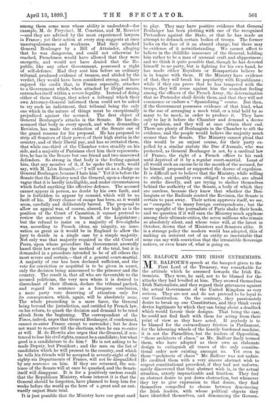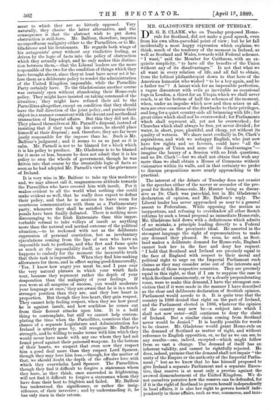MR. BALFOUR AND THE IRISH EXTREMISTS.
MR. BALFOUR'S speech at the banquet given to the First Lord of the Treasury, was remarkable for the attitude which he assumed towards the Irish Ex- tremists. They were, he said, not to be blamed for the attacks they had levelled at him. They avowed themselves Irish Nationalists, and they regard their grievances against the actual Government of the United Kingdom as very serious. They are not and do not pretend to be loyal to our Constitution. On the contrary, they passionately desire to break up our Constitution, and they think every device legitimate by which they can bring about a deadlock which would favour their designs. That being the case, he could not find fault with them for acting from their point of view as they have acted. If anybody is to be blamed for the extraordinary friction in Parliament, for the labouring wheels of the heavily burdened machine, it is not the Parnellites, but the leaders of Opposition,. " those architects of chaos," as Mr. Balfour finely termed them, who have adopted as their own an elaborate design to extinguish all traces of the only constitu- tional order now existing amongst us. Yet even to these " architects of chaos ' Mr. Balfour was not unfair. He credited them with a very sincere abstract wish to respect constitutional precedent, if they had not unfortu- nately discovered that that abstract wish is, in the actual situation, utterly impracticable and fruitless. They feel an abstract desire to put down obstruction, but whenever they try to give expression to that desire, they find themselves compelled to choose between denouncing the Irish leaders, with whose political objects they have identified themselves, and denouncing the Govern. anent to which they are so bitterly opposed. Very naturally, they choose the latter alternative, and the consequence is that the abstract wish to put down obstruction is still-born. Mr Balfour, therefore, imputes no superfluous malignity either to the Parnellites, or to Mr. Gladstone and his lieutenants. He regards both wings of his antagonists' army without any vindictive feeling, as driven by the logic of facts into the policy of obstruction which they actually adopt, and he only makes this distinc- tion between them,—that the Liberal leaders are the more responsible of the two for the condition of things which they have brought about, since they at least have never set it be- fore them as a deliberate policy to render the administration of the United Kingdom impossible, while the Parnellite Party certainly have. To the Gladstonians another course was certainly open without abandoning their Home-rule policy. They might have insisted on taking command of the situation; they might have refused their aid to the Parnellites altogether, except on condition that they should have the full direction of the joint policy, and pursue their object in a manner consistent with the. decent and methodical transaction of Imperial affairs. But this they did not do. They placed themselves at Mr. Parnell's disposal, instead of insisting that if they took up his cause, he should place himself .at their disposal ; and, therefore, they are far more justly responsible for the impasse than he. Such is Mr. Balfour's Judgment ; and it seems to us as just as it is calm. Mr. Parnell is not to be blamed for a block which it is his policy to produce. Mr. Gladstone is to be blamed for it more or less, because he does not admit that it is his policy to stop the wheels of government, •though he was driven into that course by the irresistible logic of facts so ,soon as he had adopted Mr. Parnell's view of the grievances of Ireland.
It is very wise in Mr. Balfour to take up this moderate and, we may almost call it, magnanimous attitude towards the Parnellites who have covered him with insult. For it makes evident to all the world what nothing else could make evident so well, that he really does expect to defeat their policy, and that he is anxious to leave room for -courteous communication with them as a Parliamentary party, whenever they shall be satisfied that their pro- posals have been finally defeated. There is nothing more discouraging to the Irish Extremists than this imper- turbable refusal to take volleys of insult as anything more than the natural and normal outcome of the political situation,—to be reckoned with not as the deliberate expression of personal conviction, but as involuntary ejaculations coming from the lips of men who have an impossible task to perform, and who fret and fume quite as much at the impossibility itself, as at the man who happens to embody for the moment the inexorable truth that their task is impossible. When they find him making allowances for them, and in effect saying good-humouredly, Yes, I know how angry you must be, and I pass over the very natural phrases in which your wrath finds vent, because they represent rather the depth of your desperation than the malignity of your feelings. If you were at all sanguine of success, you would moderate your language at once,' they are aware that he is in a much stronger position than they are, and they lose heart in proportion. But though they lose heart, they gain respect. They cannot help feeling respect, when they see how proof he is against insult, and how scathless he comes out from their fiercest attacks upon him. It is a bold thing to contemplate, but still we cannot help contem- plating the time when the Parnellites, conscious that the chance of a separate Legislature and Administration for Ireland is utterly gone by, will recognise Mr. Balfour's strength, and be willing to make terms with him which they would never have made with any one whom they had not found proof against their poisoned weapons. In the bottom of their hearts, we suspect that even now they respect him a good deal more than they respect Lord Spencer, though they may love him less,—though, for the matter of that, we should doubt the depth of the effusive love with which they overwhelm Lord Spencer. The Parnellites, though they find it difficult to forgive a statesman whom they have, as they think, once succeeded in frightening, will not find it difficult to forgive a statesman whom they have done their best to frighten and failed. Mr. Balfour has understood the significance, or rather the insig- nificance, of their invective ; and by understanding it, he has only risen in their esteem.



































 Previous page
Previous page